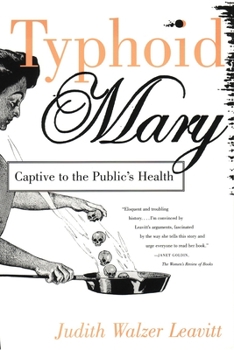Typhoid Mary: Captive to the Public's Health
Select Format
Select Condition 
Book Overview
Discover the forgotten story of Mary Mallon--the real Typhoid Mary--in this humanizing portrait offering a window into the ethical dilemmas of public health policy that continue to haunt us in the COVID era. She was an Irish immigrant cook. Between 1900 and 1907, she infected 22 New Yorkers with typhoid fever through her puddings and cakes; one of them died. Tracked down through epidemiological detective work, she was finally...
Format:Paperback
Language:English
ISBN:0807021032
ISBN13:9780807021033
Release Date:July 1997
Publisher:Beacon Press
Length:352 Pages
Weight:1.08 lbs.
Dimensions:0.9" x 6.0" x 8.9"
Customer Reviews
5 ratings
Captive to the Public Imagination
Published by Thriftbooks.com User , 16 years ago
'Typhoid Mary' has become a catchphrase for disease, pestilence, and death. Most people have heard the nickname, but few know the particulars. Judith Walzer Leavitt takes a dreaded and legendary figure in the history of public health protection, and, in a factual but entertaining style, gives us the who, what, where, when, and why. In so doing, the author also examines the age-old dilemma of individual liberty vs public safety. Typhoid Mary was an Irish immigrant cook named Mary Mallon, who spent decades as a prisoner / guest of the New York Public Health Department. As a healthy carrier, she did not exhibit typhoid symptoms herself, but the disease was transmitted via the food she prepared. Her refusal to seek a different livelihood, and aggressive deameanor toward health officials, resulted in her confinement on North Brother Island, a quarantine location, where she died in 1938. "Typhoid Mary: Captive to the Public Health" is not just a work of medical history or biography of a feisty woman who fought the system and lost. Mary Mallon, as a healthy carrier of a deadly disease, has her modern equal in the millions of people who are HIV positive or suffer from drug-resistant tuberculosis. Leavitt raises uncomfortable questions about quarantine practices and examines how past treatment of the afflicted has been based on gender and socio-economic status. Statistics and sociological arguments have a strong presence in each chapter, but they don't detract from the book's appeal to the lay reader. "Typhoid Mary" is an uneasy reminder that history doesn't always repeat itself- sometimes it never goes away in the first place.
A COMMUNITY HEALTH PROBLEM IN THE PREANTIBIOTIC ERA
Published by Thriftbooks.com User , 16 years ago
I found this book very interesting and the multiple aspects of the story are perfectly analyzed by the author. Is a good example of the social implications of a infectious disease and has strong relations with the present AIDS era we are living in. A lot of very important lessons can be learned to understand the present times. Very recomendable.
In Depth Read
Published by Thriftbooks.com User , 17 years ago
Leavitt thoroughly explores Mary Mallon's story from a number of angles - social, historical, medical, etc. and the relevance of what we can learn from her situation to modern day issues. The subject was fascinating, but the book tended to be dry and redundant in places. If you are looking to understand the issues at hand, this is for you. If you're just interested in the story of Typhoid Mary, I would recommend a slightly lighter version.
Worthwhile Read
Published by Thriftbooks.com User , 21 years ago
Typhoid Mary: Captive to the Public's Health by Judith Walzer Leavitt could be shorter. Not much shorter, just a bit shorter. The beginning of the book is surprisingly dull and a great deal of information is repeated unnecessarily. That said, Typhoid Mary is very well-written, even the dull bits. The research is well-documented and complete. And the subject matter is more than a little engrossing. Who was the woman behind the label "Typhoid Mary"? Leavitt is making the link between typhoid and AIDS, in particular the problem of finding the balance between protecting individual rights and protecting the community. She spends time on this subject towards the end of the book and has some compassionate and reasonable things to say. The strongest part of the book, however, is in the history and in Leavitt's appreciation of Mary Mallon as an individual. The most interesting parts of the book (and where the writing picks up considerably) are the chapters on the public perception of Typhoid Mary throughout the 20th century. Recommendation: Buy it if it's a subject that already interests you. Otherwise, check it out of the library.
Painstaking research into a historical personality
Published by Thriftbooks.com User , 23 years ago
Leavitt's book, Typhoid Mary, attempts to reconstruct the life and times of Mary Mallon, the first identified typhoid carrier in the United States. Mary Mallon was an Irish immigrant, and worked as a cook among the elite families of New York city. She is also the centerpiece of one of the scientific advances of the twentieth century: the understanding that some illnesses are caused by germs, rather than vague miasmas, and that apparently healthy individuals can spread these germs to others. An understanding of this scientific truth, however, raises an even more puzzling question: how can the public address these individuals who, through no bad acts on their part, are able to risk the public's health? Leavitt analyzes Mary's story with the use of seven different perspectives: that of medicine, public policy, the law, social expectations, newspaper accounts, her own, and the story's modern retelling. These seven accounts combine to provide the reader a full account of the medical and social conditions of the day, and how they combined to account for Mary's lifelong isolation. The research on this book is well-done and the writing interesting. My biggest complaint was that some of the material is repetitive, as the different perspectives do overlap at times.





